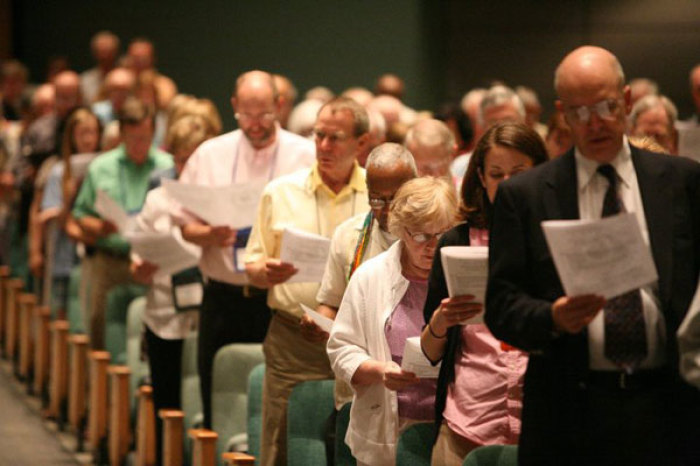PCUSA Report Says 1 in 5 Members 'Disappointed,' Considering Departure

Presbyterian Church (USA) may have as many as one-in-five of its members considering an exit from the mainline denomination, according to a recently released report.
In advance of the PC(USA)'s 222nd General Assembly in June, the largest Presbyterian Church in the nation released a report analyzing the diverse perspectives of its membership.
Titled "When We Gather at the Table: A PC(USA) Snapshot," the report sought to examine the identity of the denomination through the lenses of its members.
"Across the Presbyterian Church (U.S.A.), congregations, mid councils, and other interested
groups are discerning together who we are as a church and who God is calling us to be," stated the report.

"The Committee on the Office of the General Assembly (COGA) has also engaged in this discussion as it sought to understand the current nature of our ecclesiology, the theology of church."
The report created four categories for the respondents: "Purposeful Progressives," "Disappointed and Discerning," "Family Facilitators," and "Rooted and Resolute."
Nineteen percent of respondents were "Disappointed and Discerning," which was identified as 76 percent conservative, 23 percent moderate/mixed, and 1 percent liberal.
"Though the name given to this segment might appear to be strong, it truly reflects how they feel: forsaken, abandoned, and for some, held hostage by their denomination," continued the report.
"They are the most displeased. This group includes those who either (1) do not like their PC(USA) affiliation but are stuck in the denomination for various reasons, or (2) are conflicted and thinking about leaving the denomination."
Carmen Fowler LaBerge, president of the theologically conservative Presbyterian Lay Committee, was one of the 3,000+ respondents.
In an interview with The Christian Post, LaBerge said that she considered herself part of the "Disappoined and Discerning" category until a recent decision to join another church.
"The study confirms that the issues dividing the PCUSA are theological. There is not a shared understanding of what it means to be theologically Reformed nor what it looks like to live, individually or institutionally, submitted to the authority of God as revealed in the Bible," said LaBerge.
Regarding the possibility that as many as 19 percent of PC(USA) members are considering a departure from the denomination, LaBerge told CP that this means that hundreds of thousands are reconsidering their affiliation.
"If the segmentation accurately reflects the denomination as a whole, then some 300,000 members are discerning their denominational affiliation," continued LaBerge.
"The OGA projects a loss of 400,000 members by the end of 2020. That says to me that the denomination is not only unconcerned about the people in the D&D category, they've essentially already written them off."
According to the report, the largest category within the PC(USA) respondents was the "Purposeful Progressives" category, at 35 percent.
"Many in this group feel we need to get more involved in politics and in social action. They are less tolerant of conservative theologies within the denomination," explained the report.
"Some remain hopeful that conservatives who are upset with the 221st General Assembly (2014) decisions on marriage will see that there are different ways to interpret scripture, and will choose to stay and accept the changes, over time. Others would simply be happy if the conservatives left the PC(USA) …"
The "Purposeful Progressives" category was 85 percent liberal, 13 percent moderate/mixed, and 2 percent conservative.
Data for the report came from a joint effort by the Committee on the Office of the General Assembly (COGA) and the Presbyterian Mission Agency Research Services office.
"It outlines the results of the comprehensive effort made by COGA in late 2015 to dialogue with the church about who it is and what it is called to be," wrote Toya Richards, Assistant Stated Clerk of PC(USA).
"COGA, with the help of the Presbyterian Mission Agency Research Services office, invited anyone who wished to complete an online form with open-ended questions and to engage in group gatherings to talk about the PC(USA) in this current time and place. More than 3,000 Presbyterians responded and some 21,000 pieces of data came in."
"When We Gather at the Table" is not based off of a scientific survey, as the report itself notes occasional differences between known demographics of the Church and the sample space for their data.
"Findings from the resulting convenience sample will not be as generalizable as findings would be if they had been taken from a (random) probability sample," noted the report.
"However, an analysis of the demographics of those who participated in the study reveals that the sample somewhat matches the known demographics of Presbyterians as a whole."





























